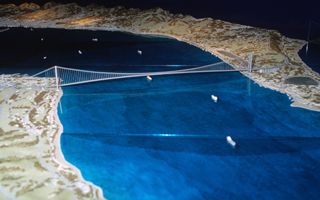(Finance) – The Strait of Messina Society And CINEA (Climate, Infrastructure and Environment Executive Agency of the European Commission) have signed the Grant Agreement for the European co-financing of the executive design costs of the bridge over the Strait of Messina. This is a non-repayable contribution of approximately 25 million euros which covers 50% of executive design costs of the Opera, for the part attributable to therailway infrastructure.
The proposal presented by the Strait of Messina in January 2024, through participation in the tender Connecting Europe Facility for Transport (CEF-T 2023), was positively assessed by CINEA as the bridge over the Strait of Messina meets the selective criteria established by the EU Commission corresponding to: “Priority and urgency, maturity, quality, impact and catalytic effect”.
In particular, the European Commission has highlighted that the project is interest collectivesince it affects all four objectives defined in the regulation of TEN-T corridorsi.e. cohesion, efficiency, sustainability and increased benefits for users. Furthermore, the Commission assessed the project process to be in a very advanced state and the quality of the current project was high. Between the parameters also evaluated the positive socio-economic and environmental impacts of the project, the reduction in travel times, noise impact and polluting emissions. Positive evaluation also for the project’s ability to increase accessibility and economic development of Calabria and Sicily by improving connections.
Participation in the CEF Call was coordinated by Ministry of Infrastructure and Transport which, through its Technical Mission Structure, plays the role of Associated Partner of the Strait of Messina.
“The signing of the grant agreement – commented the CEO of the Strait of Messina, Peter Pacifiers – together with the recent inclusion of the Bridge within the ‘Scandinavian-Mediterranean’ corridor, by the European Council, confirms the strategic role of the Opera for Europe and lays the foundations for being able to find further resources to cover construction costs of the Opera, with a concrete prospect of reducing the burden on the State budget. Furthermore, the direct intervention of the European Commission, which guarantees the presence of parameters of transparency and control on the management performance of the design, construction and management activities of the Work, could also constitute a driving force for any future interventions by the market”.
